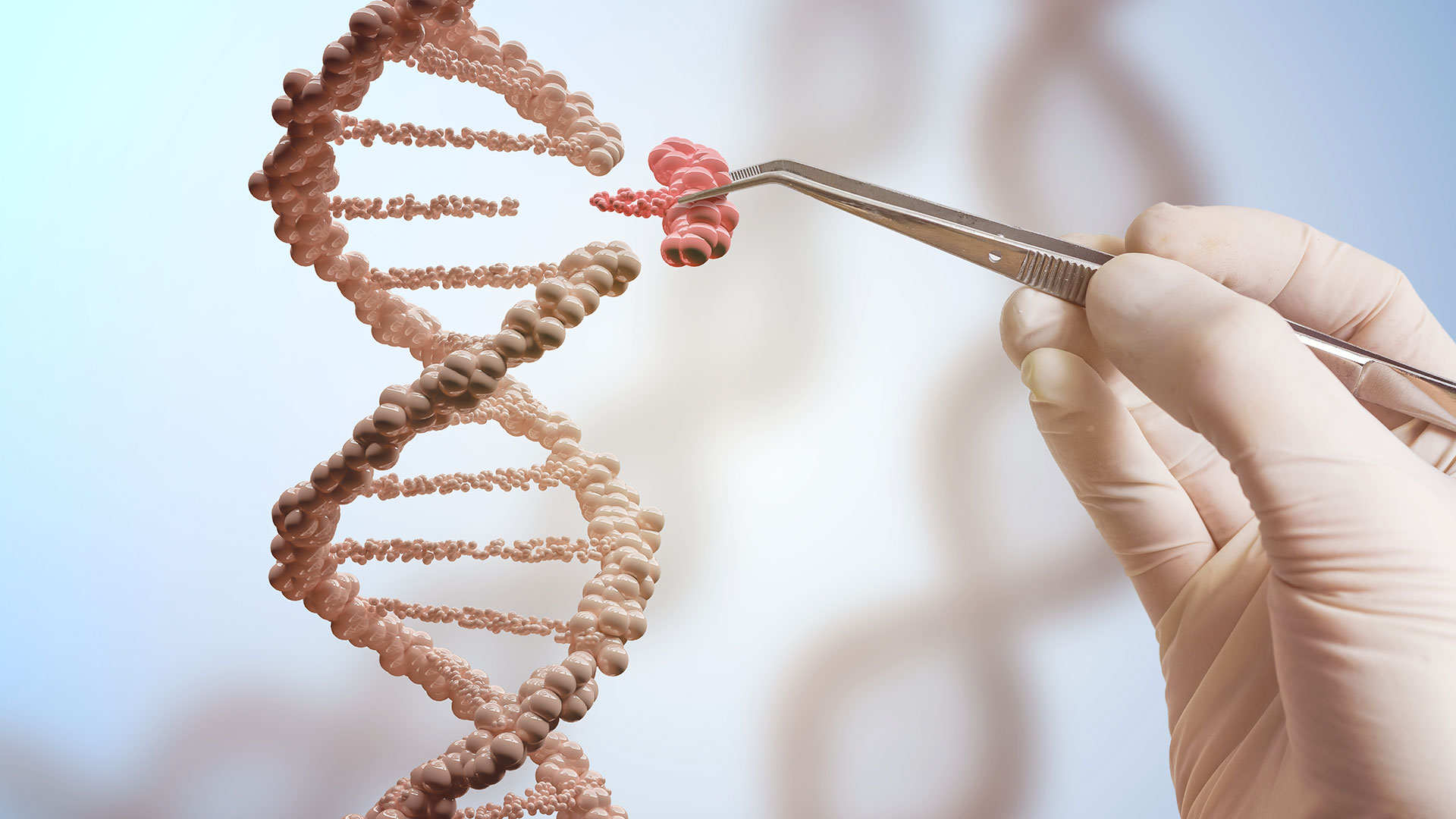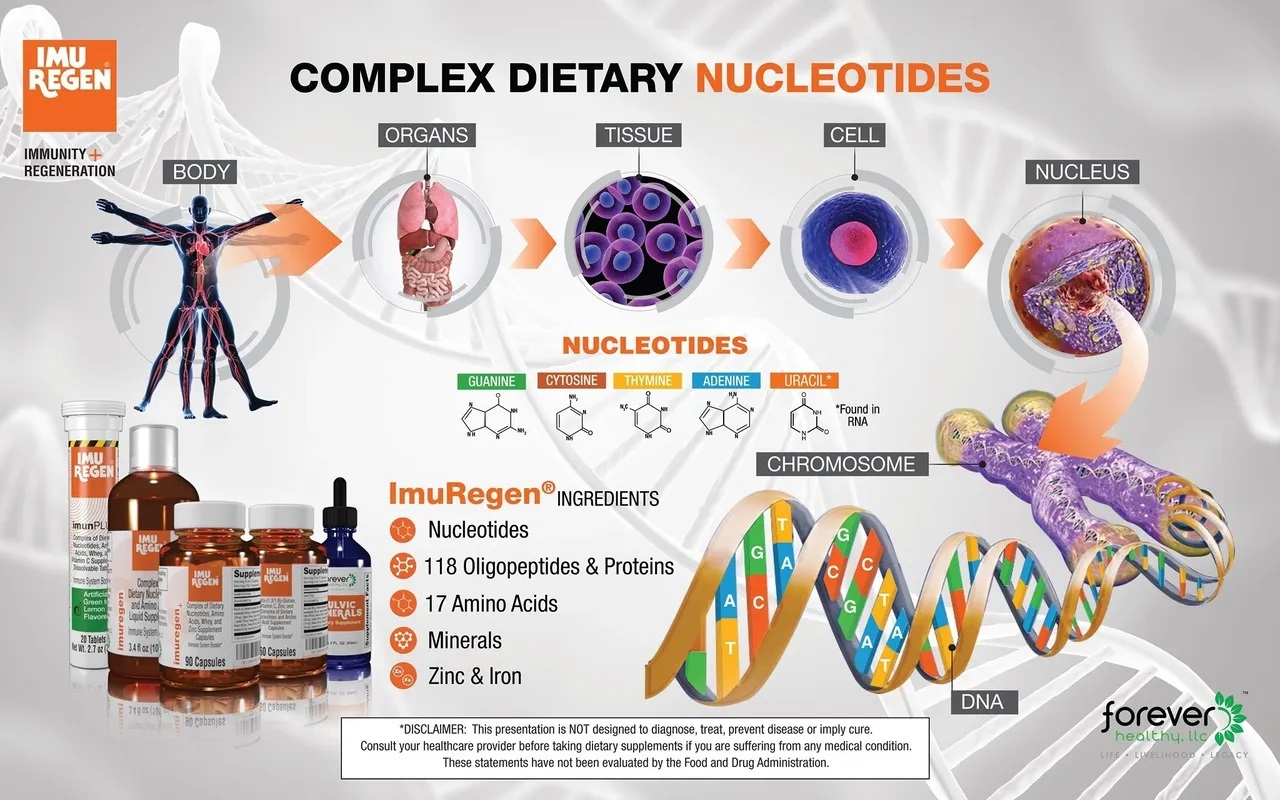Your DNA is like the blueprint for your body. It contains the instructions that code for all the proteins, enzymes, and structures that make you who you are. However, just like a blueprint can be damaged, altered, or incomplete, your DNA can also be affected by various factors, such as environmental toxins, oxidative stress, radiation, or errors in replication. These damages can lead to mutations, epigenetic changes, or functional impairment, that may increase your risk of diseases, aging, or infertility.

Therefore, it’s crucial to support your DNA with the right nutrients, so it can fulfill its vital role of protecting, repairing, and replicating itself, to maintain your health and vitality.
What are nucleotides, oligopeptides, minerals, and amino acids?
Nucleotides are the building blocks of DNA and RNA, which are the two types of genetic material in your body. They consist of a sugar, a phosphate group, and a nitrogenous base, which can be adenine, guanine, cytosine, or thymine in DNA, and uracil in RNA. Nucleotides are essential for DNA repair, replication, and transcription, as well as for cell signaling, energy metabolism, and immune function. They can be obtained from dietary sources, such as meat, fish, eggs, and yeast, or from supplements.
Oligopeptides are short chains of amino acids, the building blocks of proteins, that have specific functions in the body, depending on their sequence and structure. Some oligopeptides, such as glutathione, carnosine, and anserine, have antioxidant and anti-inflammatory properties and can protect your DNA from damage caused by reactive oxygen species (ROS) and free radicals. Others, such as tuftsin, thymopentin, and delta glutamine, can enhance your immune function, reduce inflammation, and promote tissue repair.
Minerals are inorganic elements that are essential for various biological functions, including those related to DNA stability and function. For example, zinc is a cofactor for many enzymes involved in DNA replication and repair, and deficiencies have been linked to increased DNA damage and mutations. Selenium is also involved in DNA repair, as well as in antioxidant defenses, and may reduce the risk of cancer and macular degeneration. Other minerals, such as iron, copper, and manganese, are needed for the proper folding and stability of proteins, including those involved in DNA metabolism
Amino acids are the building blocks of proteins, which are the main structural and functional components of your body. Amino acids are crucial for DNA replication, repair, and transcription, as well as for cellular signaling, metabolism, and immune responses. Some amino acids, such as cysteine, methionine, and tyrosine, are precursors of antioxidant compounds, such as glutathione, melatonin, and catecholamines, that can protect your DNA from oxidative stress and aging. Other amino acids, such as lysine, arginine, and tryptophan, are involved in immune and inflammatory responses and can modulate your DNA expression.
How can DNA nutrition optimize your health?
By supplementing your diet with nucleotides, oligopeptides, minerals, and amino acids, you can provide your DNA with the ingredients it needs to repair, protect, and maintain itself, thus optimizing your health in various ways.
For example,
DNA nutrition can:
• Improve your immune function and reduce inflammation by enhancing oligopeptide and amino acid intake, as well as mineral adequacy.
• Boost your antioxidant defenses and reduce oxidative stress by supplying your body with nucleotides, amino acids, and minerals that promote the production of glutathione, superoxide dismutase, and other antioxidant compounds.
• Enhance your tissue repair and regeneration by providing your DNA with the amino acids, minerals, and nucleotides that are needed for cell growth, differentiation, and metabolism.
• Reduce your risk of DNA damage, mutations, and epigenetic changes by protecting your DNA from environmental toxins, ROS, and radiation, through adequate intake of nucleotides, oligopeptides, amino acids, and minerals.
How can you get DNA nutrition in your diet?
While it is possible to obtain nucleotides from food sources such as liver, yeast, mushrooms, and certain types of fish, the amount of nucleotides that we can get from our diet may not be sufficient for optimal health. This is because nucleotides are rapidly synthesized and degraded in the body, and their availability depends on the turnover rate of nucleic acids and the balance between synthesis, degradation, and salvage pathways. Therefore, under specific conditions such as growth, stress, or injury, the demand for nucleotides may exceed the supply from dietary or endogenous sources, leading to a nucleotide deficit that can compromise the immune response, tissue repair, and metabolic homeostasis.
Furthermore, some factors can affect the absorption and utilization of dietary nucleotides, such as age, genetics, gut health, and cooking methods. For example, elderly people may have reduced digestive and absorptive capacity for nucleotides, leading to lower serum levels and impaired immune function. Likewise, people with certain genetic mutations may have a higher need for nucleotides, due to impaired salvage pathways or increased degradation rates. Additionally, some cooking methods, such as high-temperature roasting or boiling, can break down nucleotides and reduce their bioavailability.
Therefore, to ensure adequate nucleotide intake, especially during times of increased demand or stress, it may be beneficial to supplement with nucleotide-rich foods or supplements that are specifically designed to boost nucleotide synthesis and support immune function, tissue repair, and gut health.
In conclusion, DNA nutrition is a powerful tool to optimize your health and protect your DNA from damage that can affect your well-being and longevity. By providing your body with nucleotides, oligopeptides, minerals, and amino acids, you can enhance your immune function, reduce inflammation, improve your antioxidant defenses, and maintain your DNA integrity and function.

Leave a Reply